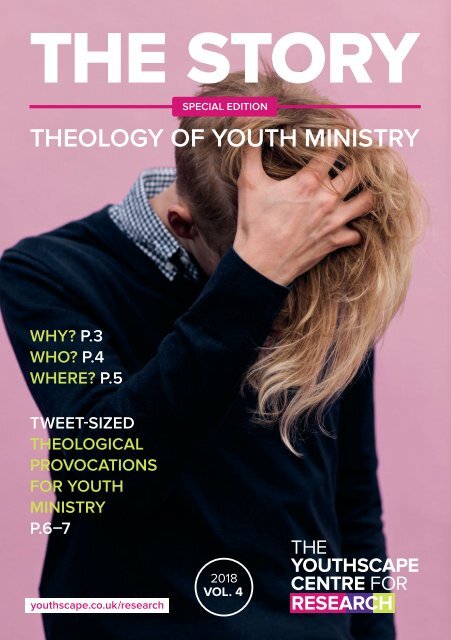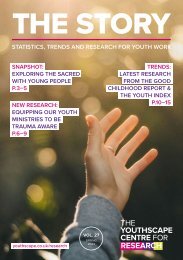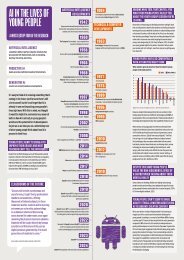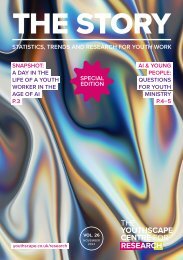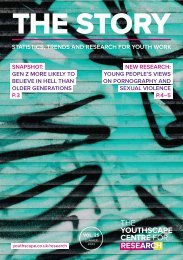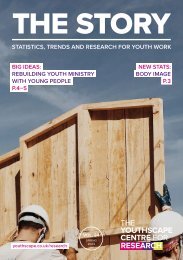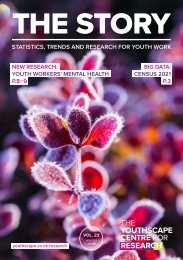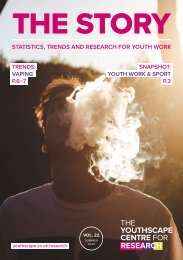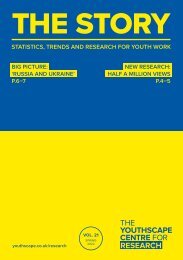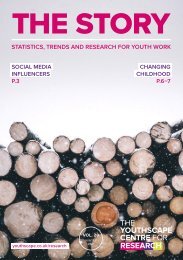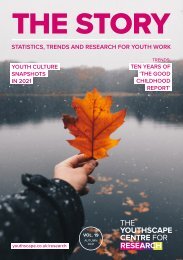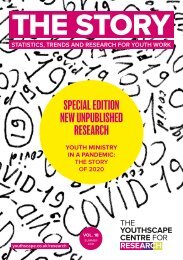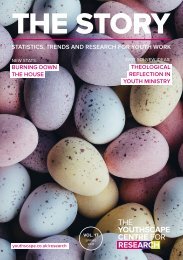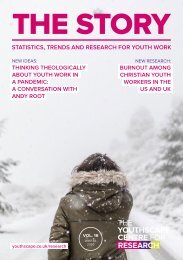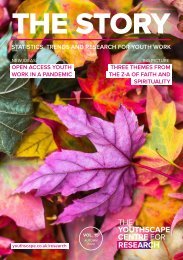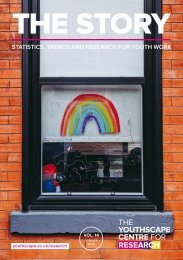the-story-vol-8
You also want an ePaper? Increase the reach of your titles
YUMPU automatically turns print PDFs into web optimized ePapers that Google loves.
THE STORY<br />
SPECIAL EDITION<br />
THEOLOGY OF YOUTH MINISTRY<br />
WHY? P.3<br />
WHO? P.4<br />
WHERE? P.5<br />
TWEET-SIZED<br />
THEOLOGICAL<br />
PROVOCATIONS<br />
FOR YOUTH<br />
MINISTRY<br />
P.6–7<br />
youthscape.co.uk/research<br />
2018<br />
VOL. 4
WELCOME TO<br />
THE STORY<br />
For this special edition we are drawing<br />
back to reflect on <strong>the</strong> role of <strong>the</strong>ology<br />
for youth ministry. Beyond <strong>the</strong> research<br />
findings, stats and trends, <strong>the</strong>ology<br />
makes sense of what we do and<br />
provokes us to deeper expressions of<br />
God’s life and love. Our four contributors<br />
look at youth ministry <strong>the</strong>ology from<br />
different angles, each of which invites us<br />
to respond.<br />
They encourage us – that relationships<br />
with young people are not a means to<br />
an end because Christ is already present<br />
<strong>the</strong>re, working in <strong>the</strong>ir lives. They<br />
bring vision – when we build on solid<br />
<strong>the</strong>ological foundations we can resist<br />
anxiety and despair about young people<br />
or youth work and look to God. They<br />
give us practices – like ‘reflexivity’ so we<br />
see how our <strong>the</strong>ology grows out of <strong>the</strong><br />
soil of our lives, and we can be open to<br />
o<strong>the</strong>r perspectives, grown from different<br />
soil. And <strong>the</strong>y bring challenge – that<br />
<strong>the</strong> Gospel young people encounter is<br />
carried in <strong>the</strong> way we do things, and that<br />
we need to broaden <strong>the</strong>se experiences<br />
to reflect <strong>the</strong> fullness of God.<br />
Enjoy working out how to respond!<br />
Dr Lucie Shuker<br />
Head of research, Youthscape<br />
To sign up for future editions of<br />
THE STORY, and to receive printed<br />
versions, visit youthscape.co.uk/<br />
research<br />
IN THIS ISSUE:<br />
WHY?<br />
Phoebe Hill<br />
WHO?<br />
Mark Scanlan<br />
WHERE?<br />
Sally Nash<br />
TWEET-SIZED PROVOCATIONS<br />
FOR YOUTH MINISTRY<br />
Pete Ward<br />
YOUTH WORK DIAGRAMS<br />
PULL-OUT POSTER<br />
Micah Purnell<br />
IN THE<br />
PREVIOUS<br />
ISSUE<br />
P.3<br />
P.4<br />
P.5<br />
P.6–7<br />
P.8<br />
REVERSE<br />
We included <strong>the</strong> latest research from<br />
Prayer Spaces in Schools. To view<br />
<strong>the</strong> full research report for yourself,<br />
visit prayerspacesinschools.com/<br />
research2017<br />
WHY?<br />
A few years ago, I had reached <strong>the</strong> end of my<br />
te<strong>the</strong>r with my youth group. Nothing seemed<br />
to be ‘working’ with <strong>the</strong> young people who<br />
were attending, and worse still <strong>the</strong>y seemed<br />
to resent being <strong>the</strong>re, having been made to<br />
attend by <strong>the</strong>ir parents.<br />
I became overwhelmed by this idea that <strong>the</strong><br />
youth group was not ‘working’. I felt like I was<br />
responsible, and that it was up to me to fix it,<br />
but I had no answers. I felt like I was failing <strong>the</strong><br />
young people in my church, and every week<br />
was a painful reminder of this fact. I started to<br />
resent going to youth group because I felt bad<br />
and I felt responsible. I kept thinking to myself:<br />
‘For goodness sake, I have a professional youth<br />
work role as my day job and I can’t even run<br />
a youth group successfully!’ My prayer times<br />
became strategy meetings with God where I<br />
would plead for a ‘solution’ to <strong>the</strong> ‘problem’<br />
of my group. I began to run <strong>the</strong> youth group<br />
from this place of anxiety and desperation and<br />
resentment.<br />
My experience is a microcosm of <strong>the</strong> anxiety<br />
and desperation we might feel on a national<br />
level when we think about young people<br />
and <strong>the</strong> Church in <strong>the</strong> UK. Reports on church<br />
attendance (including our own research, Losing<br />
Heart) confirm <strong>the</strong> low numbers of young<br />
people in churches up and down <strong>the</strong> country.<br />
Fewer and fewer attendees at youth ministry<br />
training colleges suggest declining numbers of<br />
those going into church-based youth ministry<br />
in <strong>the</strong> first place. These pressures can make us<br />
fearful. We can start to operate our ministries<br />
from a ‘deficit’ mindset, of plugging a gap, of<br />
channelling resources to where <strong>the</strong>y are most<br />
needed. We begin operating out of fear, not out<br />
of faith; out of lack, not out of love. We fall into<br />
<strong>the</strong> trap of ‘economising’ or ‘technologising’ in<br />
youth ministry, focusing only on what ‘works’,<br />
on <strong>the</strong> most impactful or effective way of<br />
working, and on numbers over individual people.<br />
Out of desperation, we start looking anywhere,<br />
everywhere, for <strong>the</strong> answers, clinging on to <strong>the</strong><br />
latest ‘silver bullet’ which might just provide <strong>the</strong><br />
solution. We can even end up removing God<br />
from <strong>the</strong> picture entirely.<br />
Root and Dean identify a ‘rhetoric of despair’<br />
and an absence of <strong>the</strong>ological thinking in youth<br />
ministry. They argue that youth ministry must<br />
be rescued from ‘decades of foster care in<br />
<strong>the</strong> social sciences in order to return it to its<br />
<strong>the</strong>ological home’ 1 . Root and Dean explain that,<br />
‘We must begin to see ourselves not primarily<br />
as youth ministry directors but as <strong>the</strong>ologians<br />
who do constructive <strong>the</strong>ology in <strong>the</strong> context<br />
of ministry with <strong>the</strong> adolescent population’ 1 .<br />
Thinking <strong>the</strong>ologically about our youth ministry<br />
helps us to orient ourselves to God’s perspective.<br />
Thinking <strong>the</strong>ologically about our youth ministry<br />
helps us to operate and evaluate our ministries<br />
through a <strong>the</strong>ological lens, focusing on how<br />
God sees <strong>the</strong>m and what his priorities are,<br />
and ultimately remembering that he is actively<br />
in<strong>vol</strong>ved in <strong>the</strong>m.<br />
Thankfully, my youth group turned a corner.<br />
After months of feeling like we were getting<br />
nowhere, young people began to encounter God<br />
for <strong>the</strong>mselves, and everything changed. Things<br />
started to click into place. Young people seemed<br />
to want to be <strong>the</strong>re. Hey, I even wanted to be<br />
<strong>the</strong>re again! By God’s grace, he hadn’t removed<br />
himself from <strong>the</strong> picture, even if I had. As we<br />
look to <strong>the</strong> future of our own ministries, and think<br />
about what it is that we want to achieve, our<br />
hopes and dreams for <strong>the</strong> young people present<br />
and our vision for <strong>the</strong> group, how can we think<br />
<strong>the</strong>ologically about our ministries, and remember<br />
God’s active presence in <strong>the</strong>m?<br />
Phoebe Hill Is a researcher at Youthscape and<br />
a doctoral student at King’s College London.<br />
1. Root, A. and K.C. Dean, The <strong>the</strong>ological turn in youth ministry. 2011, Downers<br />
Grove, IL: IVP Books.<br />
P.2<br />
P.3
WHO?<br />
It is not uncommon to talk about <strong>the</strong>ology for<br />
or of youth ministry, though <strong>the</strong> question of<br />
who does this <strong>the</strong>ology is rarely asked. It is my<br />
contention that Christian youth workers need<br />
to see <strong>the</strong>ir role as facilitating <strong>the</strong> <strong>the</strong>ological<br />
expression of young people and helping <strong>the</strong>m<br />
to name, nurture and nourish that expression.<br />
This means that <strong>the</strong> ‘who’ of <strong>the</strong>ology in youth<br />
ministry is <strong>the</strong> young people in conversation<br />
with us and <strong>the</strong> wider Christian community<br />
past and present.<br />
One of my favourite moments in <strong>the</strong> Old<br />
Testament is in 1 Samuel 3. Samuel is a boy<br />
under <strong>the</strong> tutelage of <strong>the</strong> elderly priest Eli.<br />
God has been silent and distant when, in <strong>the</strong><br />
middle of <strong>the</strong> night, Samuel hears a voice and<br />
assumes Eli is calling him. Three times he gets<br />
up and twice he is sent back to bed before, on<br />
<strong>the</strong> third occasion, Eli realises what is going on<br />
and directs Samuel to say ‘speak Lord for your<br />
servant is listening’.<br />
Theology is about discerning who God is and<br />
how God is at work in <strong>the</strong> world. Consequently,<br />
any <strong>the</strong>ology for youth ministry needs to<br />
engage with <strong>the</strong>se questions in relation to<br />
<strong>the</strong> lives of young people. It follows <strong>the</strong>n that<br />
<strong>the</strong>ology is not simply something given, to be<br />
passed on and held dear. Ra<strong>the</strong>r it is something<br />
to be discovered and to participate in toge<strong>the</strong>r,<br />
in order that we become aware of <strong>the</strong> activity<br />
and character of God 1 . Andrew Root draws on<br />
<strong>the</strong> work of practical <strong>the</strong>ologian Ray Anderson<br />
in framing this approach to <strong>the</strong>ology as being<br />
about discerning ‘Christopraxis’ 2 . This is defined<br />
as <strong>the</strong> ongoing ministry of Christ through his<br />
Spirit and in<strong>vol</strong>ves a rich understanding of<br />
God’s actions through <strong>the</strong> earthly ministry of<br />
Christ, alongside being open to <strong>the</strong> Spirit of<br />
God in <strong>the</strong> present.<br />
As with Samuel, <strong>the</strong> young people might not<br />
be able to articulate what <strong>the</strong>y experience as<br />
<strong>the</strong> activity or voice of God so <strong>the</strong>y need some<br />
guidance in developing <strong>the</strong>ir understanding.<br />
This does not mean that we tell <strong>the</strong>m what God<br />
is doing or saying, but ra<strong>the</strong>r that we help <strong>the</strong>m<br />
to discern <strong>the</strong>se things and <strong>the</strong>n we listen. In<br />
this way <strong>the</strong>ology operates as conversation.<br />
By embracing <strong>the</strong>ology as conversation we<br />
embrace a rhythm to <strong>the</strong>ology that recognises<br />
that our understanding of God is provisional and<br />
relational 3 . This does not mean that anything<br />
goes. Ra<strong>the</strong>r, as Samuel and Eli remind us, this<br />
conversation needs both openness to God<br />
moving in new ways and deep knowledge of God<br />
that stems from a life of devotion.<br />
The image of conversation in <strong>the</strong>ology is helpful<br />
as <strong>the</strong> best conversations are not when you<br />
come to my understanding or vice versa, but<br />
ra<strong>the</strong>r as ‘you and I come to an understanding<br />
toge<strong>the</strong>r’ 4 . The exciting outcome of this approach<br />
to <strong>the</strong>ology when working with young people<br />
is that, as in <strong>the</strong>se best conversations, we grow<br />
toge<strong>the</strong>r in our awareness of what God is doing.<br />
And if Root is right in challenging us to see<br />
relationships in youth ministry as <strong>the</strong> place in<br />
which Christ is present ra<strong>the</strong>r than as a means of<br />
influencing young people 5 <strong>the</strong>n <strong>the</strong>ology flows<br />
from <strong>the</strong>se relationships in which both young<br />
people and leaders are engaged in <strong>the</strong> process<br />
of discernment.<br />
So who does <strong>the</strong> <strong>the</strong>ology in youth ministry? We<br />
all do. And we do it humbly in community, aware<br />
of our own provisional understanding of God.<br />
And we do it with a keen desire to set free <strong>the</strong><br />
<strong>the</strong>ological expression of young people.<br />
Dr Mark Scanlan Is <strong>the</strong> Lecturer in Theology<br />
and Youth Ministry at St Mellitus College.<br />
1. See Paul S. Fiddes, Participating in God: A Pastoral Doctrine of <strong>the</strong> Trinity<br />
(Darton, Longman & Todd Ltd, 2000); “Ecclesiology and Ethnography: Two<br />
Discipline, Two Worlds,” in Perspectives on Ecclesiology and Ethnography,<br />
ed. Pete Ward (Cambridge, UK: William B Eerdmans, 2012). 2. Andrew Root,<br />
Christopraxis: A Practical Theology of <strong>the</strong> Cross (Fortress Press, 2014);<br />
Ray S Anderson, The Shape of Practical Theology: Empowering Ministry<br />
with Theological Praxis (IVP Academic, 2001). 3. See N. T. Wright, The New<br />
Testament and <strong>the</strong> People of God: Christian Origins and <strong>the</strong> Question of God<br />
V. 1 (SPCK Publishing, 1992), 136. 4. Terry A. Veling, Practical Theology: “On<br />
Earth as It Is in Heaven” (New York: Orbis Books, 2005), 61. 5. Andrew Root,<br />
Revisiting Relational Youth Ministry (Downers Grove, Il.: InterVarsity Press,<br />
2007).<br />
WHERE?<br />
When God asked Adam ‘Where are you?’<br />
(Genesis 3.9) I think God already knew <strong>the</strong><br />
answer. I wonder, however, if Adam and Eve<br />
did in anything o<strong>the</strong>r than a very literal way.<br />
There are many different ways to answer<br />
<strong>the</strong> question ‘where are you?’ and this has<br />
implications for <strong>the</strong> way that we do <strong>the</strong>ology<br />
around youth ministry. Adam and Eve were<br />
ashamed of <strong>the</strong>ir nakedness, which was <strong>the</strong><br />
reason that <strong>the</strong>y were hiding (implied by<br />
Genesis 2.25). Their context had changed,<br />
<strong>the</strong>y had eaten from <strong>the</strong> tree of knowledge of<br />
good and evil (Genesis 3.6), and consequently<br />
<strong>the</strong>ir behaviour had changed. Our ‘where’,<br />
our context, impacts <strong>the</strong> way we do <strong>the</strong>ology<br />
around youth ministry.<br />
We often use <strong>the</strong> word ‘contextual’ when<br />
talking about ‘where’, realising that such<br />
things as our geographical, socio-political<br />
and ecclesiological settings (corporately) and<br />
gender, ethnicity, sexuality, (dis)ability, and<br />
social class (individually) all have an impact on<br />
our <strong>the</strong>ological thinking. Jesus was incarnate<br />
in a particular geographical, historical and<br />
social context, was male, and a jew, all of which<br />
impacted <strong>the</strong> way that he lived, ministered and<br />
died. How does our context – historically as<br />
well as now – impact <strong>the</strong> way we do <strong>the</strong>ology in<br />
youth ministry?<br />
I would encourage <strong>the</strong> asking of <strong>the</strong> question<br />
‘where am I?’ in thinking about <strong>the</strong>ology in<br />
youth ministry. The technical term that we use<br />
(particularly in research) in relation to this is<br />
‘reflexivity’. This asks <strong>the</strong> question of how who I<br />
am (holistically) impacts my understanding and<br />
<strong>the</strong> way that I work. When we think, talk or write<br />
about youth ministry we do not do so in a value<br />
neutral way. It is shaped by our experiences,<br />
our beliefs, and our values, and it is important<br />
that we understand <strong>the</strong>m so that we see any<br />
bias or assumptions that we are bringing to our<br />
<strong>the</strong>ology of youth ministry. It is also good if we<br />
understand where o<strong>the</strong>rs are coming from when<br />
we explore <strong>the</strong>ir <strong>the</strong>ology of youth ministry.<br />
My teenage years were formative in shaping<br />
my <strong>the</strong>ology; where I attended church made a<br />
difference. I started going to a Baptist church<br />
with a school friend where I heard <strong>the</strong> Gospel<br />
communicated in a different way to my childhood<br />
Sunday School experiences. My youth group<br />
leaders talked about evangelism and took us<br />
out door to door. We were encouraged to think<br />
about <strong>the</strong> importance of Christians being active<br />
in society, <strong>the</strong> responsibility of voting, being<br />
in<strong>vol</strong>ved in social action, as well as <strong>the</strong> need to<br />
spend time daily with God. Most of this came as<br />
a consequence of regular group Bible study. I<br />
can still see <strong>the</strong> outworking of those things in my<br />
life now. I have never missed voting in any local<br />
or national election and my aim is still to spend<br />
time daily with God in something recognizable to<br />
my teenage self as a quiet time. Where I grew up<br />
shaped me, my <strong>the</strong>ology and my practice. Where<br />
are you?<br />
Rev Dr Sally Nash Is <strong>the</strong> Director of <strong>the</strong><br />
Midlands Institute for Children Youth and<br />
Mission.<br />
P.4 P.5
TWEET-SIZED<br />
THEOLOGICAL<br />
PROVOCATIONS<br />
FOR YOUTH<br />
MINISTRY<br />
The Gospel takes cultural<br />
form in <strong>the</strong> things that we do<br />
in youth ministry. By grace<br />
Jesus is present through <strong>the</strong><br />
Spirit in <strong>the</strong> cultural forms of<br />
expression youth ministers<br />
have created. Cultural forms<br />
of expression however are<br />
always limited even as and<br />
while <strong>the</strong> Spirit is present and<br />
active.<br />
Youth ministry should be<br />
shaped by <strong>the</strong> Gospel.<br />
Problem is in our cultural<br />
forms of expression this<br />
connection has been almost<br />
forgotten. The Gospel has<br />
become a set of ideas that<br />
we present at conversion.<br />
When that is over and done<br />
with what we actually do<br />
comes from somewhere else.<br />
The actual Gospel we<br />
present is not seen in <strong>the</strong><br />
doctrine we say but in <strong>the</strong><br />
way we habitually lead young<br />
people to encounter Christ in<br />
and through cultural forms of<br />
expression.<br />
Youth Ministry has<br />
stalled and ceased to be<br />
<strong>the</strong>ologically and culturally<br />
creative because <strong>the</strong> cultural<br />
forms that we celebrate and<br />
inhabit have become <strong>the</strong> only<br />
way we can see God working<br />
in young people’s lives.<br />
We have been told that<br />
worship is <strong>the</strong> main event.<br />
Jesus through <strong>the</strong> Spirit has<br />
blessed so many of us in this<br />
way. But even as we meet<br />
with Jesus, are we being<br />
called elsewhere?<br />
Promoting our stuff and<br />
being excited about what<br />
God is doing in and through<br />
our stuff should not prevent<br />
us from an on-going critical<br />
and <strong>the</strong>ological evaluation<br />
of our practice. If something<br />
new is going to develop<br />
<strong>the</strong>n this becomes an urgent<br />
necessity.<br />
Is Church really <strong>the</strong> answer<br />
to mission? When growing<br />
and planting church has<br />
become <strong>the</strong> key priority,<br />
youth ministry has adapted<br />
to largely serve this agenda.<br />
TBH it’s not really working.<br />
Large events disguise <strong>the</strong><br />
wi<strong>the</strong>ring of groups at a<br />
congregational level.<br />
Relational youth ministry got<br />
it right in starting with young<br />
people outside of <strong>the</strong> Church.<br />
It does however struggle<br />
to disciple. The key is to<br />
link missional outreach to<br />
ongoing Church community.<br />
So Church is <strong>the</strong> answer but<br />
only if we get things in <strong>the</strong><br />
right order of priority. When<br />
worship is <strong>the</strong> main event this<br />
is hard to imagine.<br />
The legacy of Soul Survivor<br />
is immense. We have seen<br />
amazing life poured out on<br />
young people and <strong>the</strong> Church<br />
through Soul Survivor and<br />
everyone else influenced by<br />
Wimber and <strong>the</strong> charismatic<br />
Movement. As plans are<br />
laid to generate a new thing<br />
we need to honestly ask<br />
ourselves: what has been <strong>the</strong><br />
down-side, and how are we<br />
being called to do something<br />
that is better? How can we<br />
prioritise genuine mission?<br />
Cultural forms include:<br />
Organisations, events,<br />
worship songs, social media,<br />
what we wear, what we<br />
preach, how we pray, how<br />
we lead. Each of <strong>the</strong>se carry<br />
a take on how we see God<br />
working and hence <strong>the</strong>y<br />
reveal what <strong>the</strong> Gospel is for<br />
us in practice.<br />
The cultural forms we<br />
inhabit have us in a grip that<br />
is both a blessing and curse.<br />
It is way easier to do <strong>the</strong><br />
Christian groups and worship<br />
events thing than to do<br />
relational and mission-based<br />
outreach. The fact is that <strong>the</strong><br />
rest of <strong>the</strong> Church doesn’t<br />
really want anything else.<br />
Church assumes we start<br />
with Christian young people.<br />
This is why mission-based<br />
relational youth ministry has<br />
been quietly dropped. In<br />
<strong>the</strong> current climate, mission<br />
outside <strong>the</strong> Church is off<br />
<strong>the</strong> agenda, whatever <strong>the</strong><br />
rhetoric.<br />
Dr Pete Ward Is professor of Practical<br />
Theology at Durham University.<br />
P.6 P.7
NATIONAL YOUTH MINISTRY WEEKEND BINGO<br />
A speaker<br />
in a denim<br />
shirt<br />
Gratuitous<br />
use of Greek<br />
“Let’s move<br />
into a time<br />
of…”<br />
A resource<br />
with a hashtag<br />
on it<br />
A National Youth<br />
Ministry Weekend<br />
T-shirt<br />
Technical<br />
issues<br />
‘And I’ll close with<br />
this…’ (cue 10<br />
more minutes)<br />
Awkward<br />
conversation at an<br />
exhibition stand<br />
A speaker who<br />
‘We’re trending!’ ‘Lord I JUST pray…’<br />
goes over time<br />
A Bible<br />
Standing room<br />
only<br />
Someone who didn’t<br />
intend to be in a<br />
seminar (but now<br />
can’t leave)<br />
A large group<br />
of Hungarians<br />
Someone wearing<br />
last year’s goodie<br />
bag<br />
For more #youthworkdiagrams follow us on Twitter @YWresearch<br />
Bute Mills, 74 Bute Street,<br />
Luton, LU1 2EY<br />
TWITTER POLL<br />
In this issue’s Twitter<br />
poll we decided to ask a<br />
genuine research question!<br />
We asked youth workers*:<br />
‘What’s been <strong>the</strong> most<br />
useful resource for<br />
your youth ministry<br />
this year?’<br />
hello@youthscape.co.uk<br />
01582 877220<br />
Registered charity no. 1081754.<br />
Registered company no. 3939801<br />
registered in England, a company<br />
limited by guarantee.<br />
43%<br />
A BOOK<br />
26% A VIDEO<br />
7% A PODCAST<br />
24%<br />
A DOWNLOAD (e.g. PDF)<br />
*Based on 58 responses.<br />
P.8


